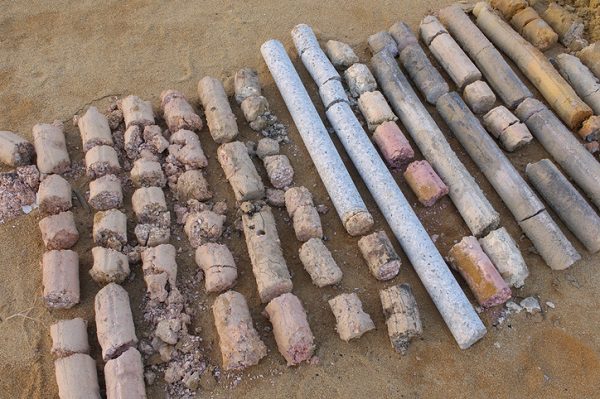Geotechnical investigations: Deal or dud?
Some home builders wonder about the importance of geotechnical investigations. With the cost of a geotechnical investigation ranging in the thousands of dollars, it may seem like an unnecessary expense. Today, we’ll define what a geotechnical investigation is, whether it’s required, whether it’s worth the cost, and how 2-10 Home Buyers Warranty (2-10 HBW) supports home builders after a geotechnical investigation.
What is a geotechnical investigation?
A geotechnical investigation is a soil report. It analyzes and characterizes surface and subsurface conditions. It identifies geologic hazards and provides site development and foundation recommendations.
Is it required or optional?
Home builders often ask, “Am I required to get a geotechnical investigation?” The answer is often, “Not always, but . . .” Here’s what we mean.
In general, home builders should use geotechnical investigations if geologic hazards (e.g., expansive soils) are likely, if there are past foundation failures in the area, or if completing them is a local standard practice or code requirement.
According to Walt Keaveny—Risk Manager and Principal Engineer with 2-10 HBW—most industry groups recommend geotechnical investigations, and structural engineers can be found liable for designing foundations without one. A growing number of building departments require them, especially in elevated-risk areas, such as in Texas.
However, the International Building Code, Section 1803, specifies that builders require a geotechnical investigation for questionable soils, expansive soils, shallow groundwater table, pile and pier foundations, variable rock strata, and for footings on fill material more than 12 inches in depth.
Because an investigation can cost a decent chunk of money, builders also want to know whether it’s worth it when it isn’t required.
Is it worth it?
Yes, a geotechnical investigation is worth it. Building homes without knowing the soil conditions can be a crapshoot—a roll of the dice that you can only hope works out for you.
Think about some of the questions you’re responsible for answering as a builder.
- Are there geologic hazards like expansive soils, improperly compacted existing fill, buried debris, collapsible soils, soft or organic soils, hard rock, sinkholes, or unstable slopes?
- Is there any shallow groundwater that might seep into excavations, crawl spaces, or basements?
- Can you reuse onsite soils to balance cut and fill?
- How should you properly compact your fill?
- Are you using the most appropriate and cost-effective foundation?
A geotechnical investigation is the best way for you to answer those questions accurately. And accurately answering those questions is crucial to your success and your future.
What are the risks of not getting a geotechnical investigation?
As the leading provider of structural warranties, 2-10 HBW has investigated claims since the 1980s. We’ve discovered that the impact of soils on the foundation causes 80% of all structural claims.
This is shocking because in most cases, structural damage to a home you’ve built that’s caused by soil conditions is outside your control. Nonetheless, you’re still responsible for addressing structural issues caused by soil movement. Without an investigation, you’re essentially gambling that nothing will go wrong.
Builders who use geotechnical investigations, on the other hand, are up to 50% less likely to experience structural claims.
Additionally, you may be able to cancel out the cost of the investigation based on the information you receive from it. For instance, after completing a geotechnical investigation, you may position yourself to use the lowest cost foundation for site-specific conditions, balance cut and fill to avoid importing fill, and avoid construction delays due to subsurface surprises.
Finally, a geotechnical investigation can help you defend yourself if you ever faced arbitration or litigation related to a structural defect claim.
Are there any other options besides a geotechnical investigation?
Yes, but you should always take caution when considering alternative methods.
For example, instead of using geotechnical investigations, some home builders rely on prior excavation experience in the general area, soil maps, or surface-soil grab sample analysis.
These methods might work in some low-risk undisturbed areas. However, it’s unlikely that you’ll get the results you need from these methods in the long run.
Subsurface conditions can vary greatly over short lateral distances, such as from lot to lot within the same subdivision. The rule of thumb among geotechnical engineers regarding the consistency of subsurface conditions is that there is no rule of thumb. The only way to really know what lurks below the surface is to explore by drilling or digging.
How 2-10 HBW supports you after a geotechnical investigation
A geotechnical investigation is definitely a good deal in the long run. Another good deal after you complete your investigation and construction is a structural warranty from 2-10 HBW.
A structural warranty from 2-10 HBW is written and backed by insurance. It covers qualified structural damage caused by soil movement, which, again, is the cause of 80% of structural defects. The average cost of a structural defect ranges between $42,000 and $113,000. It’s simply a smart idea to protect yourself against those risks.
Learn how you can protect your business and add valuable selling points to your new builds with a 2-10 HBW structural warranty.
Special thanks to Walt Keaveny, whose expertise inspired this article.
Related content
Which Structural Claims Are the Most Expensive for Builders?








